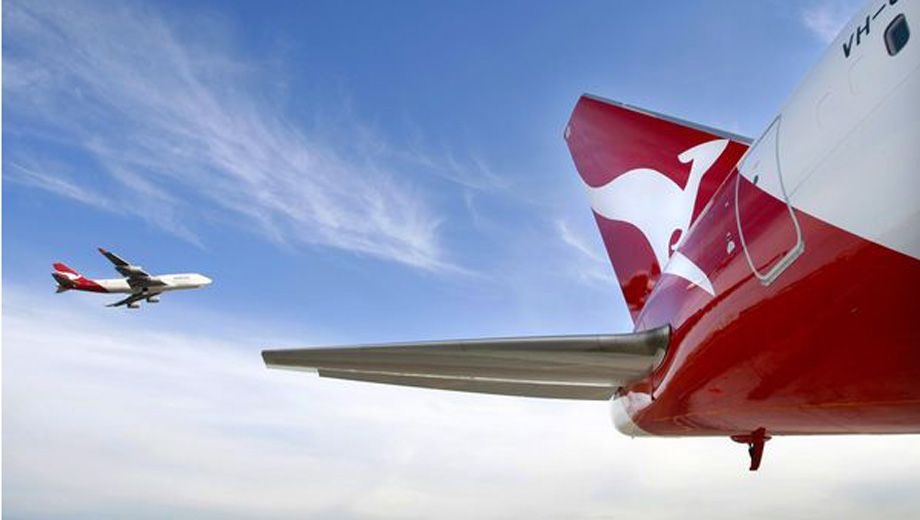The Qantas Sale Act of 1992 has taken centre stage in the ongoing debate over the airline's future – but exactly what is the Qantas Sale Act, what restrictions does it impose on the airline, and why does Qantas CEO Alan Joyce think it should be changed?
Here's a quick summary of the Qantas Sale Act.
Introduced in 1992, ahead of Qantas being taken out of government ownership and fully privatised, the Qantas Sale Act imposes strict limits on foreign ownership of the airline.
- Any single foreign investor is limited to a 25% stake in Qantas
- Foreign airlines can hold no more than 35% of Qantas shares in total
- Total foreign ownership of Qantas is capped at 49%
For example, if one foreign airline was to take up a 25% stake in Qantas, it would leave only 10% on the plate for a second foreign airline before they hit the 35% ceiling for overseas airlines.
This would also mean that any additional overseas investment in Qantas could not come from any other airline – and regardless of where it came from, it would be limited to 14%, at which point the limit of 49% total foreign ownership would be reached.
The Qantas Sale Act and the 'level playing field'
The core of Qantas' argument against Virgin Australia is that Virgin is not constrained by similar foreign ownership restrictions.
At the time of writing, some 64% of Virgin Australia was held by its three partner airlines alone: Air New Zealand has a 24.5% stake, with Etihad Airways holding 19.9% and Singapore Airlines at 19.8%.
(Add a further 7.4% cornerstone stake held by Sir Richard Branson's Virgin Group and Virgin Australia's total foreign ownership stands at just over 71%.)
Changing the Qantas Sale Act
Qantas is lobbying to overhaul the Qantas Sale Act's cap on foreign investment, but while the Federal Government is seen to be broadly supportive of this, the ability of revised legislation to pass the Senate is uncertain.
Labor and the Greens together hold the numbers to block such legislation in the Senate under its current make-up.
They will lose that majority on July 1 when the new Senators-elect (voted in at the September 2013 Federal Election) take their seats.
This could create the environment for changes to the Qantas Sale Act depending on the position of newly-elected Senators.
But will any airline invest in Qantas?
Despite the fact that foreign airlines can already hold as much as 35% of Qantas under the terms of the Qantas Sale Act, Emirates President & CEO Tim Clark has already ruled out investment in the airline.
"Equity is not on the table” Clark says, while also taking a shot at Gulf competitor and Virgin Australia partner Etihad Airways by admitting that while he “will watch [the Qantas situation] carefully”, Emirates didn't possess Etihad's "bottomless pit of cash."
Qantas downplayed Clark's statement, with a Qantas spokesman telling Australian Business Traveller that "we’ve been clear since day one that our partnership with Emirates isn’t about equity or ownership."
"It’s about network, frequency, lounges, loyalty programs and customer experience."
Follow Australian Business Traveller on twitter: we're @AusBT


Singapore Airlines - KrisFlyer
14 Jan 2014
Total posts 340
Emirates have made it clear (at this stage) that they don't want an equity share in Qantas, but what about other carriers? Is any part of the 35% available, currently taken up by an overseas airline?
12 Jun 2013
Total posts 732
Nope, no foreign airline owns any significant fraction of Qantas. As of the last annual report, the top shareholders are all big financials -- JP Morgan, HSBC, National Nominees (is that NAB?) and Citicorp own, between them, about 75% of the company.
Other interesting notes on the top 20 shareholders: someone called "The Senior Master of the Supreme Court" owns 0.44% -- but now I look it up I see that this just means that the ownership of these shares is currently being disputed in the court. There's also two individuals: Alan Joyce and someone called Pamela Honora Ditchfield, about whom I can find nothing at all.
However the ownership is so top-heavy that these last two only have about $2 million worth of shares each. So there you have it -- for the price of a nice four-bedroom house in a good suburb you can get your name in the Qantas annual report as a top-20 shareholder.
Singapore Airlines - KrisFlyer
14 Jan 2014
Total posts 340
Thanks Hugo, really helpful!! So the 35% QSA cap seems to a bit of a red herring, since no overseas airlines currently hold any Qantas equity (or seem interested in doing so)
Qantas - Qantas Frequent Flyer
02 Jul 2011
Total posts 1374
Hugo - those big financials are all "Nominee" accounts - which essentially means they hold those shares on behalf of the true "Beneficial" owneres - mostly super funds and investment managers. Essentially an outsourced paperwork function but it helps hide the true owners, albeit you still have a requirement to lodege a Substantial Shareholder Notice if you own over 5%. Most companies will send tracing notices to Nominee companies on a regular basis to keep track of the real register.
Speedbird - Not aware of any foreign aviation shareholder although as mentioned above you could own 4.9% and not have to report it. BA obviously had 25% at one point but sold out long ago
I think also worth noting that while Qantas International operates under the main Qantas AOC then Australia's air rights means that international shareholders are also limited to 49% as otherwise Qantas would lose the rights to International routes.... Note that Virgin has gotten around this by restructuring the International part, albeit not reporting distinct shareholders, management or financials
05 Apr 2012
Total posts 2
As someone with some knowledge in this area I'm consistently amazes by the lack of understanding demonstrated by both specialist and generalist journos when writing on the Qantas Sale Act. Firstly, most of the restrictions in the QSA apply to Qantas Airways Ltd and its scheduled international passenger services i.e. NOT QF domestic, not Jetstar, not Qantas Link, not Jetstar Asia. You get the idea!
Secondly, QF and the Australian Dept of Transport have consistently said before Senate inquiries and elsewhere that the QSA does not apply to subsidiaries of Qantas Airways Limited in particular Jetstar. Now, whether this is right or not is a matter of some conjecture but it's never been tested and is unlikely to be.
Thirdly, even if the QSA was repealed QAL would still be subject to a majority local ownership requirement because of the Air Navigation Act - as is Virgin. The question to be asked is what legal barriers prevent QAL replicating the Virgin structure? The answer to that one is a lot easier than overcoming the political barriers holding back such a change.
Fourthly, current government policy since Deceember 2009 (as expressed in the Aviation White Paper) is to remove the intermediate caps on foreign investors and foreign airlines (i.e. The 25/35 limitations referred to in the article). I can't imagine that policy on removing the intermediate caps will change under the Coalition! Qantas didn't ever press this change with the former Government and then lost any chance when Alan Joyce put the fleet on the ground at the end of 2011.
so, can we have an informed debate on this please? There are answers and some of the lie in a transition away from designating Australian international airlines by majority local ownership to designation based on Incorporation and Principal Place of Business. The real challenge is in managing that transition.
Singapore Airlines - KrisFlyer
08 Aug 2012
Total posts 31
Totally Agree - the premise of this debate is that Virgin is doing something wrong and Qantas are hamstrung. Strategically Qantas have many options to comply with the QSA but also grow other subsidiaries to compete against Virgin (and others). AJ and the Qantas Board just need to get on with the job and not use politics to fight an global industry in constant transition.
Singapore Airlines - KrisFlyer
14 Jan 2014
Total posts 340
So, as I thought, the QSA restrictions are all a red herring.
a: why would lifting the 35% cap make a difference since no overseas airlines have invested in Qantas todate (or seem interested in doing so).
b: Qantas have corporate structural options available now which they don't seem to be utilising.
Qantas seem to be crying foul re: Virgin as an excuse to cover mismanagement.
07 Oct 2012
Total posts 1250
I still find it odd that foreign airlines can operate a domestic airline without restrictions. In my opinion, domestic airlines should be majority Australian owned.
Singapore Airlines - KrisFlyer
14 Jan 2014
Total posts 340
Bloomberg recently had an article on Qantas which included a quote from Deutcher Bank. The guy quoted stated that the domestic market held the potential of generating profits of $ 1 billon per annum (don't know if that was A$ or USD).
How that is possible, I don't know since both Qantas and Virgin both keep posting losses. Go figure
12 Jun 2013
Total posts 732
That's because Virgin and Qantas keep fighting each other, instead of teaming up like a nice cosy duopoly to rip off the consumer (like, say, Coles and Woolies).
A billion dollars a year doesn't sound that much, it's only forty bucks for every Australian.
21 Apr 2012
Total posts 3006
bondias,
Thank you for your insights! Notwithstanding, why was it in the merger discussion between Qantas and BA, Qantas indicated that the QSA was the elephant in the room?
Was that just an excuse?
Qantas - Qantas Frequent Flyer
20 Sep 2013
Total posts 462
Qantas sales act,may it per long the agony.The real issue is core costs and be it LA or LHR or ant other destination it simply costs Qantas more than any other in the world to operate their aircraft.
02 Jan 2013
Total posts 70
Yes the costs associated with qantas management is quite high as compared to other airlines in the world.For each aircraft ,Qantas must have ten times as much management as compared to other airlines in the world.
25 Jan 2014
Total posts 9
How come Qantas made a profit every year prior to Mr Joyce becoming CEO. I think the there should be a change to the CEO and not the sale act, get rid of Joyce, put an Australian back in the CEO role that was born here and lives here, who understands that Qantas is not just an airline but is a part of Australia. (Queensland and Northern Territory Aerial Services founded in November 1920) is our Aussie Icon and airline.
If the govenment changes the Qantas sales act and the airline then becomes Foreign owned,in my opinon part of the condition of sale should be that the Qantas Icon of the Red Kangaroo can no longer be used as a brand of Qantas, because it now owned by foreigners. replace the Red Kangaroo with the globe of the world.
25 Jan 2014
Total posts 9
That should have been Flying Kanagaroo (white) on a red background) not red Kangaroo.
Hi Guest, join in the discussion on The Qantas Sale Act explained